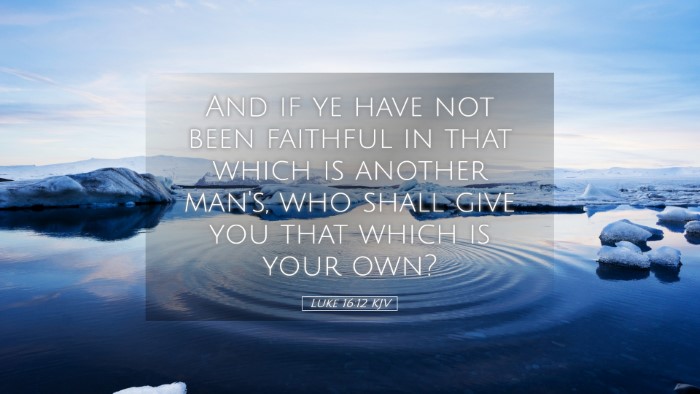Bible Commentary on Luke 16:12
Luke 16:12 states: "And if you have not been faithful in that which is another man's, who shall give you that which is your own?" This verse carries significant implications regarding stewardship, faithfulness, and the divine principles of reward in the Kingdom of God. The following analysis combines insights from prominent public domain commentaries to provide a comprehensive understanding of this biblical text.
Contextual Analysis
The broader context of Luke 16 contains the Parable of the Unjust Steward, where Jesus addresses how earthly stewardship reflects spiritual stewardship. In this parable, the steward is reproved for his unfaithfulness to his master's goods, illustrating the importance of being faithful in all aspects of life. Here, Jesus shifts from discussing the treachery of the steward to highlighting a fundamental truth regarding faithfulness and reward.
The Importance of Faithfulness
According to Matthew Henry, faithfulness in small matters is a precursor to being entrusted with greater things. Henry emphasizes that faithfulness in another person's property indicates a character that is reliable, trustworthy, and honorable. Jesus asserts that those who handle worldly goods with integrity will be considered for spiritual treasures.
- Responsibility: Faithfulness in stewardship extends to all aspects of our lives, not just financial or material possessions.
- Trust: God observes how we manage what belongs to others as a measure of how He can trust us with heavenly rewards.
Stewardship and Eternal Reward
Albert Barnes elaborates on the implications of being unfaithful stewards. He points out that God’s expectations for His people include a demonstration of integrity and responsibility in all dealings. Barnes suggests that the statement "who shall give you that which is your own?" conveys the idea that greater blessings and responsibilities in the Kingdom of God directly correspond to our faithfulness here on earth.
- Divine Principles: God's principles of reward are grounded in our earthly faithfulness.
- Greater Possession: This verse challenges believers to consider how they manage God’s blessings today, as it directly impacts their future inheritance.
Theological Implications
Adam Clarke emphasizes the theological depth of this verse. He posits that faithfulness in stewardship is not merely about material possessions but also encompasses spiritual gifts, relationships, and responsibilities entrusted to us by God. Clarke notes that God's judgment will reflect our faithfulness in these various realms.
- Spiritual Gifts: Are we faithful in using the gifts God has given us for His glory and the benefit of others?
- Relationships: How we manage our relationships—especially in being trustworthy and dependable—matters in the Lord’s eyes.
Application for Pastors and Students
For pastors and theology students, Luke 16:12 serves as a poignant reminder of the attributes that are essential for effective ministry. Faithfulness transcends material wealth; it is about integrity, accountability, and an unwavering commitment to God’s work.
- Integrity in Ministry: Leaders must be model examples of stewardship, demonstrating their commitment to the resources entrusted to them by God and the church.
- Accountability: The expectation of accountability in ministry aligns with the principles outlined in this verse, where how pastors manage what is given to them reflects their relationship with God.
Conclusion
In summary, Luke 16:12 encapsulates the essence of divine stewardship, urging believers to reflect on their faithfulness in all matters. Whether it pertains to material possessions, spiritual gifts, or personal relationships, this verse serves as a compelling challenge to live with integrity, ensuring that we honor God in every aspect of our lives. As interpreted through the lenses of noted commentators such as Matthew Henry, Albert Barnes, and Adam Clarke, the call to faithfulness is a mandate that resonates deeply for those in ministry, study, and spiritual leadership.


